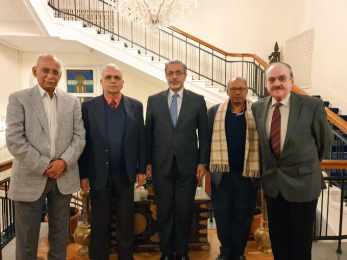The Russian Institute for Strategic Studies (RISS), Moscow, hosted Vivekananda International Foundation (VIF) at Moscow on 24-25 September 2019, for a two-day Round Table Conference (RTD) on ‘Afghanistan Crisis and the Problems of its Settlement: Prospects of Russia-India Cooperation in Afghanistan;
The RTD was the second such annual event and followed the first hosted by VIF in New Delhi in 2018. The meeting was co-chaired by Director RISS, Mikhail Efimovich Fradkov, former PM of Russian Federation, and Dr. Arvind Gupta, Director of VIF and India’s former Deputy National Security Advisor. The Russian delegation consisted of senior members and eminent researchers such as Dr Vyachselav Usov, Mr Konstantin Kokarev, Ms Maria Khaitseva, Ms Ivetta Frolova, Mr Georgy Sizov, Mr Sergey Ermakov, Mr Vladimir Svedentsov, Ms. Irina Komissina, Mr Nikolay Troshin and Mr Mikhail Makarevskiy, all drawn from RISS.
The Indian delegation included Gen Ravi Sawhney former Deputy Chief of Army Staff, Sh Alok Joshi, former Secretary, Sh Gautam Mukhopadhya and Sh Amar Sinha, both former Ambassadors to Afghanistan. The inaugural session was also addressed by the Indian Ambassador to Russia, HE DB Venkatesh Varma.
The round table sessions consisted of two major agendas-
- Features and trends of the situation in Afghanistan and Results of efforts and challenges in resolving the Afghan crisis and,
- Problems of Economic Recovery in Afghanistan, potential opportunities and the real practice of external partner’s interaction with Kabul in the resolution of social and economic problems of Afghanistan.
These two overarching subjects encapsulated a number of sub-themes covering a wide range of subjects such as current situation, the election and its outcome, the US-Taliban peace talks, role and positions of other regional partners and organizations, economic opportunities and outlook of Afghanistan, Afghanistan’s relations with Russia and India and also the possibilities of greater regional cooperation. The note below captures some of the key themes discussed at the intensive interaction held with traditional candor in keeping with the special and strategic relationship that Russia and India enjoy.
Peace and Stability
The discussions recognized that the ongoing crisis in Afghanistan affects all regional countries and stakeholders. It was essential to get all regional stakeholders on board for the promotion of useful cooperation for stabilizing Afghanistan especially when the US is looking at complete withdrawal. It was also noted that Taliban had not shown any desire to bring peace to Afghanistan and has continued to inflict violence randomly while engaging in high visibility ‘peace talks’. It was also clear that the year-long engagement that USA had with the Taliban had not met any success yet, but there was hope that the paused efforts may restart soon. Also, the threat of terrorism and drug trade was affecting both Russia and India alike. These threats will persist till Afghanistan remains in turmoil, and acts as a magnet for terrorists from around the world, particularly from the Syrian theatre. There are signs that some elements have already moved, and more may join.
It was also underlined that for both for Russia and India interests of the Afghan people was paramount and therefore needed to be freed from interference from neighbors as well as the influence of foreign fighters that are joining the Islamic State, which has taken roots in Afghanistan. It is essential that any peace deal agreed upon preserves the achievements of the last 18 years and this should cover all domains such as military, education, human rights, and rights of women. It was clear that any diplomatic initiative will not meet instant success, and peace may not descend today or tomorrow, but the process needs to be inclusive so that every angle of the problem is looked at and every stakeholder’s position taken care of. Principally, the Taliban would need to show flexibility and work towards peace rather than focus on gaining power. There are apprehensions that Taliban may eventually seek a monopoly on power in Afghanistan.
Alternate scenarios such as no-deal exit were also evaluated along with the possible role of other regional organizations such as the SCO. The Russian and Indian position on terrorism is unambiguous and is spelled out in the Russia-India joint statement issued at Vladivostok on 5 September 2015. They have supported the Bishkek declaration of the SCO and the work of the SCO’s Afghanistan contact group. It was also underlined that any peace deal should include guarantees that are verifiable and a strong commitment to the Afghanistan National Security Forces (ANSF). A ceasefire by Taliban would be welcome signal of its true intentions.
Economics
To emerge as a viable sovereign state, Afghanistan requires sustainable economic development by a complete utilization of its ample resources. In this regard, regional partners can play an important role in the reconstruction of Afghanistan. Stability in Afghanistan requires that poppy cultivation from the country is weaned away through viable alternatives and innovative steps such as buy-back arrangements, agricultural extension services, and above all, opening up markets and trade routes. Further, it is important that the leakages are plugged, the economy is formalized and pulled out of the control of mafias and terror groups, and financial sector substantially strengthened. It was recognized that the lure of easy money from drugs also contained the seeds of splitting the Taliban, and could cause an eventual power struggle between competing groups fighting to control the resources. Increasing domestic production with larger exportable surpluses will help Afghanistan in reaping the full benefit of regional economic integration. At the same time, alternate trade options such as Lapis Lazuli or the new corridor through Chabahar port will bring the world closer to Afghanistan. It is equally important that serious efforts will be required to substantially bring down the cost of ANSF and the entire warfighting effort.
Conclusion
It was felt that given the inclusive and participative nature of the Moscow format of intra-Afghan talks, this process needs to be continued and strengthened. Afghan continues to suffer inhuman levels of violence but despite all the tribulations and threats from Taliban people have supported the democratic process and also remain open to reconciling with the Taliban. Peace needs to be given a chance based on the dictum that “bad talks are better than a good war”. In order to do that, both the warring sides have to show equal measure of commitment. The regional stakeholders need to play a supportive and constructive role in forging intra-Afghan unity.








Post new comment